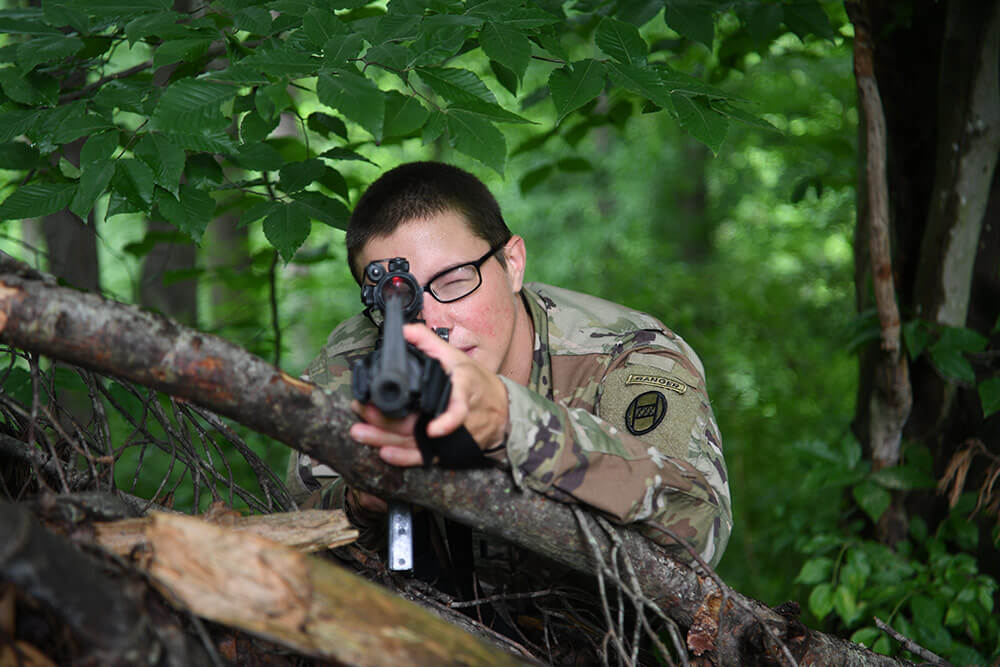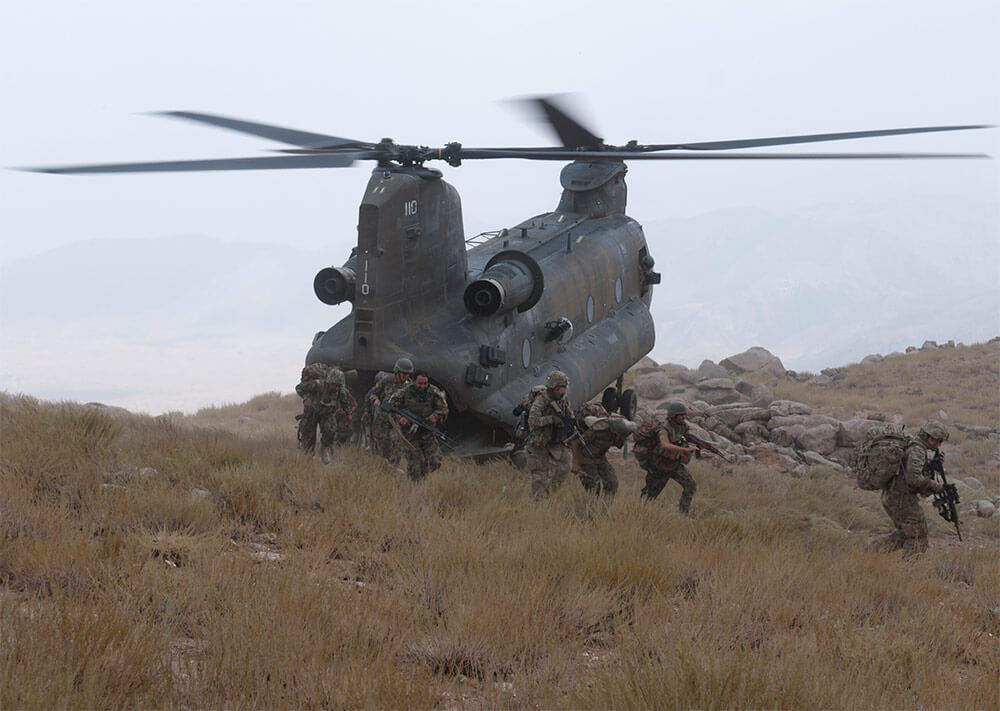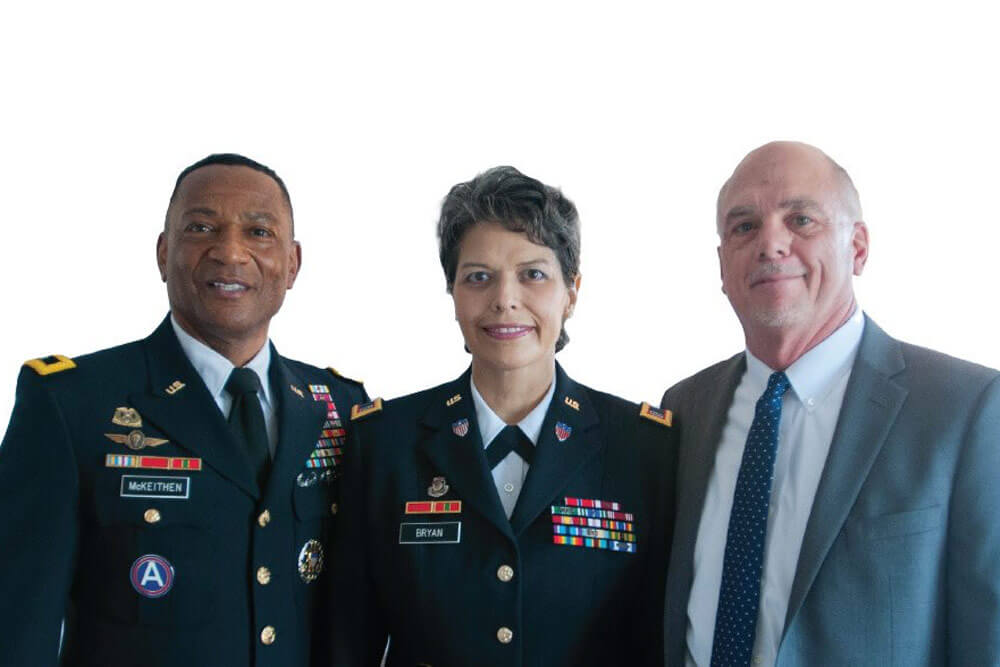Oklahoma Guard Soldiers Overcome Adversity with Ingenuity
When CPT Amanda Thornton, company commander for the Oklahoma Army National Guard’s 2120th Engineering Company (Vertical), acknowledged the unexpected challenges faced by her unit while deployed to Iraq, Kuwait, and Syria, and how overcoming those challenges was part of the experience of being there.
“It was all at once, [a] constantly changing environment,” she said, describing the workload of the company’s 156 Soldiers who were deployed in support of Operation Inherent Resolve. “Everyone kept saying, ‘It’s a marathon – it’s not a race,’ but I tell you, it is the fastest marathon you ever ran. It was a whirlwind. I’d definitely say it was more challenging than your average drill weekend.”
The 2120th is a vertical engineering company – the company’s Soldiers construct buildings and structures from the bottom up. The unit is made up of electricians, plumbers, carpenters and masons. They perform everything from wood framing, to electrical and utility work, to full housing construction.
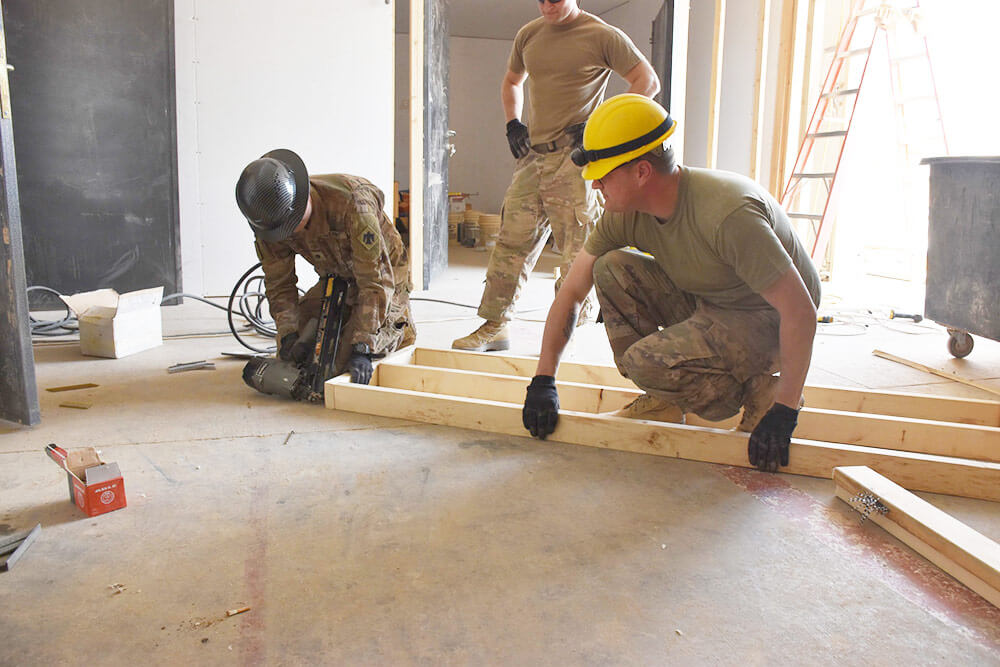
“On this deployment, we did a little bit of everything – even a little combat engineering,” CPT Thornton said. “We did some [barbed] wire fences. I had some of the Soldiers with me from the horizontal construction operators [heavy equipment operators who prep sites for engineering companies], and they did tank ditches, berms and defensive postures for the area of operations. At the same time, we were building a two-story troop medical clinic.” The company’s deployment ran from the summer of 2017 through this past spring. The Soldiers landed as a single unit in Kuwait, but within 72 hours of hitting the ground all of the unit’s personnel were spread throughout three countries – Kuwait, Iraq and Syria. They were ultimately stationed across 13 different locations throughout the region – all supporting different missions as part of Operation Inherent Resolve, CPT Thornton said.
All did not go smoothly in the company’s efforts. CPT Thornton noted that some unexpected supply issues impacted construction. The mission could have been jeopardized if not for the Soldiers’ willingness to adjust and their ingenuity in adapting workarounds when problems arose.
“This is pretty much standard anytime we’re talking about theater construction,” CPT Thornton said. “You don’t have the right materials for what you need when you need them. It’s been that way forever. You have to try to make your design work with your Iraqi product.”
She explained how the Iraqi and American approaches to construction differ. Where local engineers may be satisfied with stacking masonry and then filling it in with stucco on the outside, American standards require rebar and mortar on the inside of the masonry blocks.
“It was very interesting,” CPT Thornton continued. “I had some very good people on that site. They were adept and very flexible. Between all the people there, we were able to make sure that any of the modifications we were making were structurally sound. It came out great.”
SGT Josh Jacox, platoon SGT for 2120th ’s 2nd Platoon, was the Non-Commissioned Officer In Charge (NCOIC) for 78 Soldiers from the 1st, 2nd, 3rd and Headquarters platoons. The Soldiers from these units spent their days working hard to build a medical clinic. The many roadblocks they faced during construction became clearer as he delved into the details of their mission.
“After about two weeks of working on the hospital, we realized that we only had about 40 percent of the material that we needed to do the whole job,” he said. “My guys put up 1,800 2x4s to frame walls. That took them about two weeks. Then we realized we were missing another 2,000 boards.”
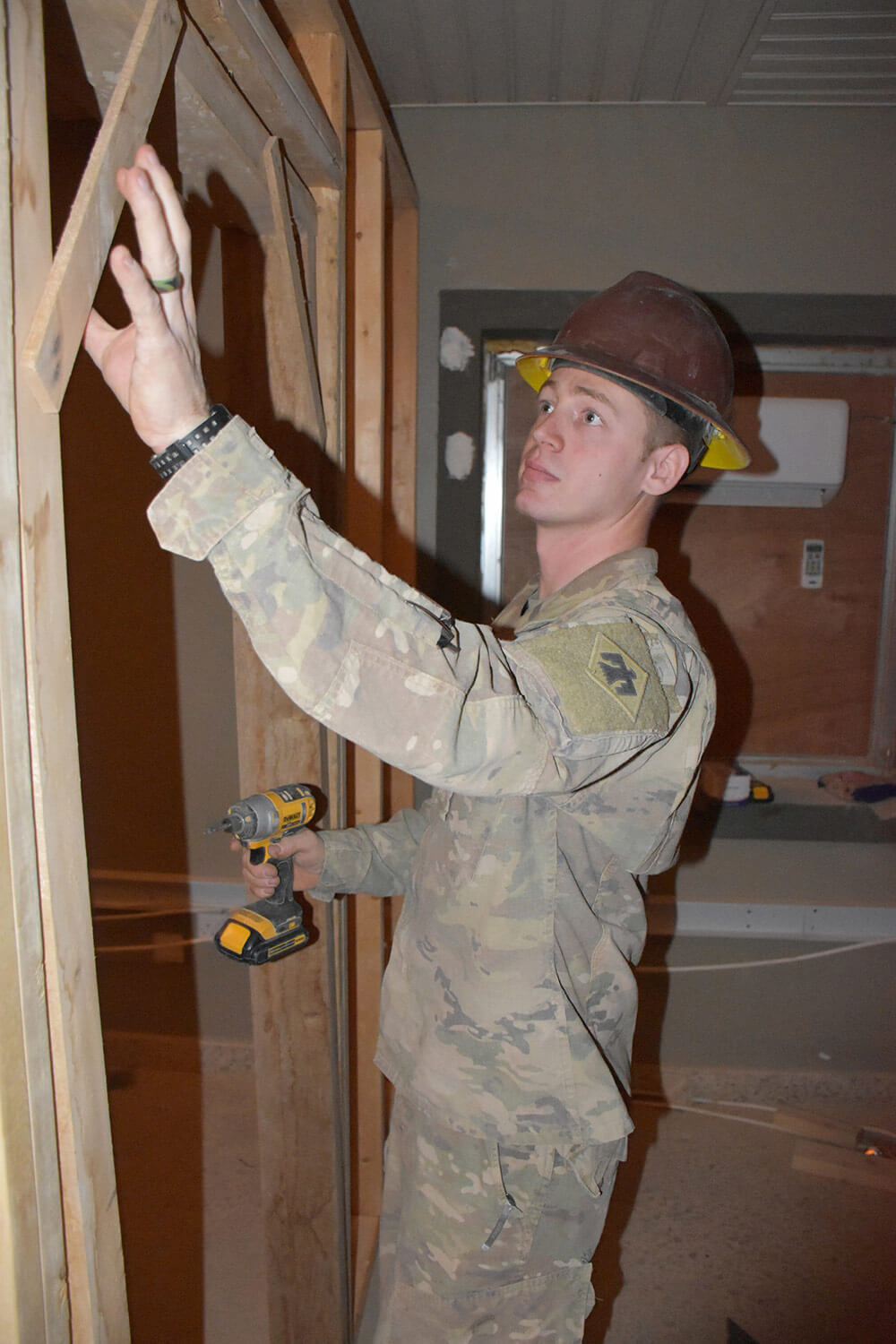
Leaning hard on their Army training, the Soldiers adapted to the situation. One of the most obvious challenges that confronted them was how to mitigate the time lost while waiting for the additional lumber to arrive.
They shifted their focus, SGT Jacox explained. With a solid background as an assistant project manager on his civilian job, it wasn’t the first time SGT Jacox had dealt with mix-ups on a job site. He moved his Soldiers to tasks that did not require lumber and did not dwell on the supply problem.
Though the holdup caused a delay in schedule, work continued at a brisk pace. Plenty of other work still remained to be done – electrical and plumbing preparation, for example. The Soldiers transitioned their efforts to those tasks.
Other projects were required as well – three to five at any given time, according to SGT Jacox. The platoons ran missions with Marine units building what SGT Jacox referred to as “tons and tons” of firebases. Managing all the personnel for the multiple missions presented a challenge of its own.
“That was difficult on our end, just because of the preparation for the personnel constantly evolving – having to send people out, then bringing them back and trying to get them cycled through. Accountability was huge. It was really difficult at times. At the same time, you still have to manage all the projects on the base. They still required a deadline that we had to hit,” said SGT Jacox.
During World War II, Army pilots would often blame unforeseen obstacles that popped up during a mission on gremlins – fictional and mischievous creatures regarded as responsible for an unexplained problem or fault. Some might say that the Soldiers of the 2120th had a gremlin or two on their medical clinic construction site, as the engineers continued to experience a level of frustration with supply-oriented issues.
But these Soldiers would not be deterred. Where there were gremlins, they made “gremlin-ade.”
“We weren’t getting the right material,” SGT Jacox recalled. “The Army would order it and then we would get a product that [technically] met the requirement, but it wouldn’t work with what we needed. Like plumbing, for example. All the piping we received was European – it was all in millimeters. All the fittings were American. They don’t work together, so you use a lot of glue.”
SGT Jacox said he knew that the glue was not the optimal solution, but it was a viable solution. He went on to say he also recognized that he needed to keep his Soldiers focused on what could be done to supply the best possible remedy under difficult circumstances.
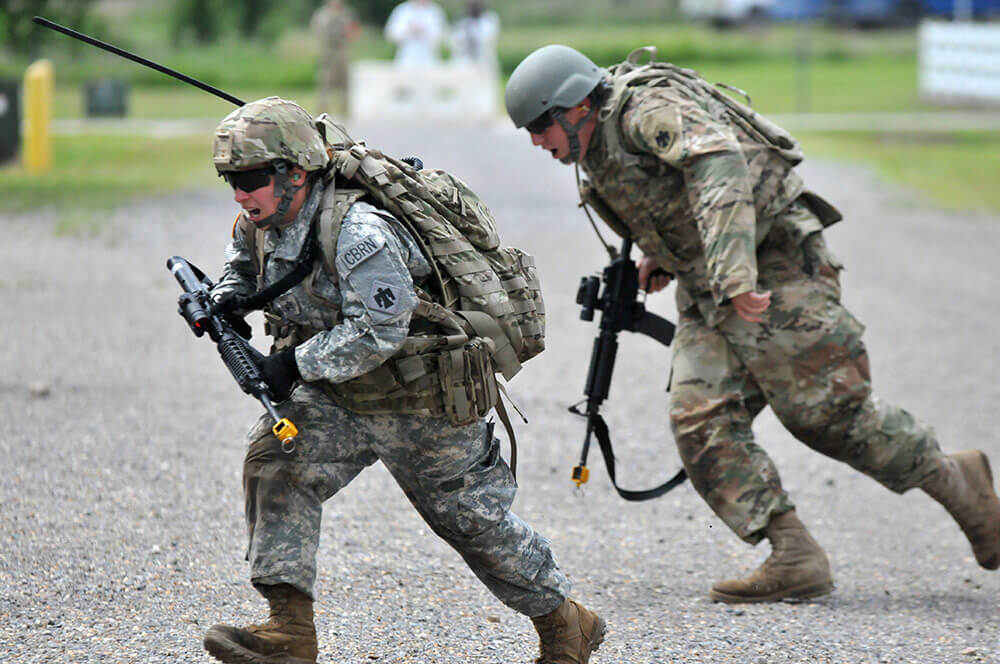
“A lot of people just wanted to give up,” he remembered. “They felt like they were being overwhelmed. We had to sit them down and tell them ‘Look, it’s not the end of the world. Let’s just think about it.’ I had really good project leads in charge of the site who were able to keep the guys on point. They got real creative.”
In the end, the solutions the engineers employed worked out exceptionally well. So well in fact, soldiers from allied forces who were also on the ground doing construction sought out the unit to learn their techniques.
“We ran into issues where a lot of [our Soldiers] didn’t know how to do framing,” SGT Jacox said. “We had to put up about 2,000 to 3,000 linear feet of walls. One of the sergeants on the team, SGT Eric Needham, built a jig – like a template – to set the walls in. Then all [the Soldiers had to] do is nail them together. It was successful to the point where the British, Danish and the Marines all came over. SGT Needham would give them classes during the day on how to do wall framing.”
Cross-training was one of the most vital aspects of the 2120th deployment. At the onset, Soldiers were not exactly excited about working outside their designated military occupational specialties (MOSs), SGT Jacox said. But once they realized how important it was to accomplishing the mission, they were all-in.
“Every one of our personnel not only worked in their MOS, but they also had [an] opportunity to cross-train,” said CPT Thornton. “We did not need as many plumbers or carpenters, but there was a need for electrical upgrades all throughout the area of operations. [In response], a group of our carpenters and plumbers cross-trained as electricians.”
The continued resiliency of the Oklahoma Guard Soldiers not only resulted in an over 15,000-square-foot medical clinic for troops on the ground in Iraq, but also in the successful completion of the 2120th’s overall mission in support of the defeat of ISIS and other extremist groups in the Middle East – gremlins or no gremlins.
“I’m really satisfied with the work that was done,” SGT Jacox said. “What we did with what we had was amazing. I had extremely knowledgeable Soldiers who went out there and kicked [butt]. I would say I had the best guys in the world.”
By Staff Writer Matthew Liptak
